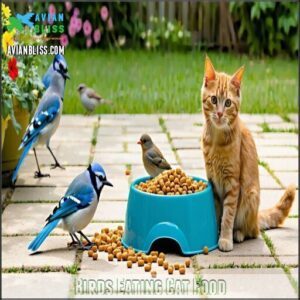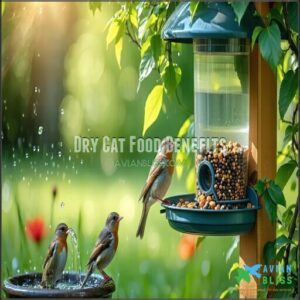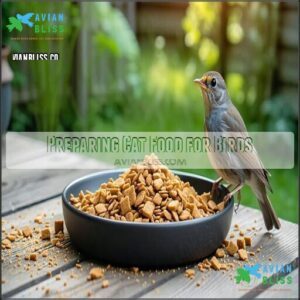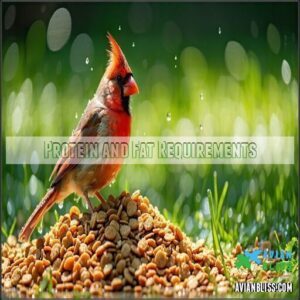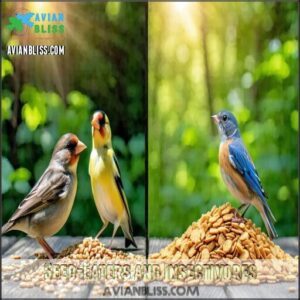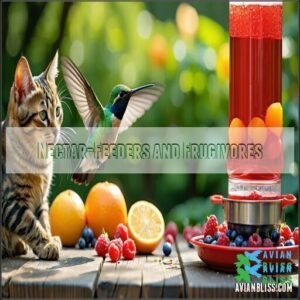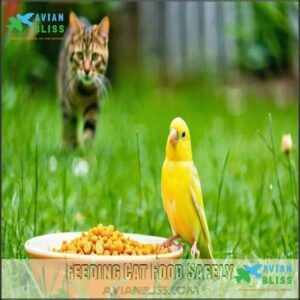This site is supported by our readers. We may earn a commission, at no cost to you, if you purchase through links.
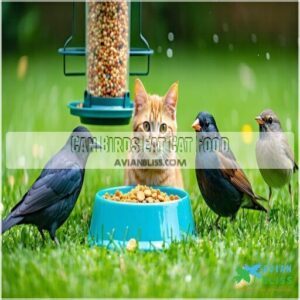
Cat food contains higher protein and fat levels than birds typically need, which can lead to nutritional imbalances.
While backyard birds might peck at kibble left outdoors, you’re better off providing food specifically formulated for avian digestive systems.
Dry cat food is less problematic than wet varieties, which spoil quickly outdoors.
Many bird enthusiasts have noticed their feathered visitors sampling cat kibble when traditional seed feeders are empty.
The protein composition differences between cat food and ideal bird nutrition reveal surprising facts about how wild birds adapt to suburban food sources, and the importance of providing the right food for their long-term health and understanding their adaptation to suburban food sources.
Table Of Contents
Key Takeaways
- While birds can eat cat food occasionally, it’s not ideal for their long-term health due to higher protein and fat levels than birds typically need.
- You’ll be better off providing food specifically formulated for avian digestive systems instead of cat food, which can lead to nutritional imbalances and health problems like obesity.
- Dry cat food is less problematic than wet varieties, which spoil quickly outdoors and pose greater health risks to birds.
- Leaving cat food outdoors disrupts local ecosystems by attracting unwanted wildlife like rodents and insects, while potentially causing birds to abandon their natural foraging roles.
Birds Eating Cat Food
You’ll often notice birds pecking at your cat’s food bowl, but this seemingly innocent behavior can lead to serious nutritional imbalances in your feathered visitors.
While birds may be attracted to cat food due to its high protein content, the formulation lacks essential nutrients birds need and contains additives that can harm their delicate digestive systems.
Cat food attracts birds with its protein punch but lacks vital nutrients while containing additives harmful to their delicate digestive systems.
Nutritional Considerations
Nearly all backyard birds may investigate cat food, but this creates serious nutritional concerns for their health.
Cat food is specifically formulated for obligate carnivores, lacking essential nutrients birds need while containing potentially harmful additives.
The nutritional mismatch creates:
- Dangerous vitamin deficiencies that weaken feathers and compromise immune function
- Severe mineral imbalances disrupting bone development and egg production
- Harmful protein overload stressing kidneys and liver function
- Excessive fat content leading to obesity and reduced mobility
Think of the nutritional value of cat food for birds like trying to fuel a car with cooking oil – technically it contains energy, but it’s the wrong formulation.
Think of feeding birds cat food like fueling a Ferrari with maple syrup—it might smell sweet, but your engine won’t thank you.
While occasional nibbling won’t cause immediate harm, regular consumption creates nutritional imbalance that can substantially shorten your feathered visitors’ lives.
Environmental Impacts
Leaving cat food outdoors disrupts your local ecosystems in several ways.
When birds abandon natural foraging for this easy meal, they neglect their essential ecological roles.
The environmental impact extends beyond your backyard, potentially creating imbalances throughout the food chain and undermining the biodiversity support that keeps natural wildlife balance intact.
| Impact | Consequence | Solution |
|---|---|---|
| Foraging neglect | Reduced seed dispersal | Provide proper bird food |
| Food chain disruption | Insect overpopulation | Feed cats indoors |
| Wildlife balance shift | Weakened biodiversity | Remove leftover cat food |
| Concentrated bird gathering | Waste accumulation | Use enclosed feeding stations |
| Rodent attraction | Disease spread risk | Maintain feeding area cleanliness |
This environmental impact can have far-reaching consequences, including disease spread risk and waste accumulation, emphasizing the need for responsible pet ownership practices to preserve the natural balance.
Attracting Unwanted Animals
While monitoring bird feeding habits is important, setting out cat food creates problems beyond bird nutrition.
Leaving cat food outdoors attracts unwanted wildlife that threatens local bird populations:
- Rodent attraction explodes as mice and rats discover this reliable food source, bringing disease spread to your yard
- Insect problems multiply when ants and flies swarm to wet cat food remnants
- Predator increase occurs when stray cats and raccoons begin visiting regularly
This neighborhood issue disrupts the ecosystem balance and creates conflicts between wildlife and humans.
This is especially concerning given the effect on bird populations.
Can Birds Eat Cat Food
You’ve spotted birds diving into your cat’s dinner bowl and wondered: can birds eat cat food?
While not immediately toxic for birds, it’s far from ideal for your feathered visitors. Opportunistic birds like crows and starlings might sample this protein-rich feast, but cat food doesn’t match avian dietary needs.
Think of it as fast food for birds—okay in an emergency but nutritionally imbalanced. Extended consumption can lead to serious health issues including obesity and vitamin deficiencies.
Instead, offer proper feeding alternatives like seed mixes or fruits that support natural foraging habits; pellet-based diets are a healthier option.
Remember: what’s good for kitty isn’t necessarily good for birds!
Cat Food Types
You’ll find two primary categories of cat food that birds might encounter in your yard: wet food with high protein content and dry kibble with varying nutritional profiles.
The type of cat food you leave accessible can substantially impact local bird populations, as wet varieties pose greater health risks while dry kibble presents fewer immediate dangers when consumed occasionally.
Wet Cat Food Risks
When birds eat cat food, wet varieties pose numerous hidden dangers.
Unlike dry options, wet cat food creates a perfect storm of health risks:
- High Fat content leads to obesity and fatty liver disease in birds
- Protein Overload strains avian kidneys and liver function
- Additives Concerns include preservatives toxic for birds
- Digestive Issues result from inappropriate moisture levels
- Spoilage Risks occur rapidly as wet food sits outdoors, harboring harmful bacteria
Don’t let that robin’s curious peck turn into a serious health problem!
Dry Cat Food Benefits
Unlike wet varieties, dry cat food offers several advantages as an occasional bird supplement.
Quality kibble provides a balanced taurine source and promotes dental health when birds peck at the crunchy texture.
It’s cost-effective and has excellent storage advantages, staying fresh longer in outdoor feeders.
For a variety of options, consider different dry food types.
The palatability factors in dry cat food make it attractive to various birds, particularly protein-seeking species during breeding season.
While convenient in emergencies, remember that cat food ingredients aren’t optimized for bird nutrition—it should complement, not replace, proper bird feed.
Preparing Cat Food for Birds
If you need to prepare cat food for birds in a pinch, proper handling makes all the difference.
While never ideal as a main food source, here’s how to offer it safely:
- Crushing Kibble: Break dry pellets into tiny pieces to prevent choking hazards, especially for smaller birds
- Soaking Pellets: Briefly moisten with warm water for 1-2 minutes to soften the texture
- Mixing Supplements: Combine with natural bird foods at a maximum ratio of 1:5 (cat food:bird food)
Always offer in small portions and remove any uneaten food after 30 minutes to prevent spoilage.
You can find various kibble products online if needed.
For ideal nutrition, bird feeding tips should focus on safe bird foods like seeds, nuts, and fruits instead of cat food alternatives.
Bird Dietary Needs
You’ll need to understand what birds actually require in their diets before offering them cat food as a substitute.
Birds need specific combinations of proteins, carbohydrates, fats, vitamins, and minerals that vary substantially between species like seed-eaters, insectivores, nectar-feeders, and frugivores.
Protein and Fat Requirements
The critical balance of protein and fat in a bird’s diet determines their overall health.
When feeding birds, understanding their unique nutritional needs is essential.
- Essential amino acids from proper protein sources support feather growth and repair
- Fat metabolism requires approximately 4% dietary fat for granivorous birds
- Energy needs vary dramatically between growing nestlings and adult birds
- Dietary ratios that exceed recommended fat content can lead to obesity and cardiac disease
Cat food’s high-fat content disrupts these carefully balanced requirements, potentially causing severe nutritional deficiencies.
Seed-Eaters and Insectivores
Your backyard hosts two distinct bird types with vastly different nutritional needs.
Understanding these differences helps explain why cat food isn’t ideal for either group.
| Bird Type | Natural Diet | Cat Food Issue | Safe Alternative |
|---|---|---|---|
| Seed-Eaters | Seeds, grains, nuts | Protein too high, lacks fiber | Sunflower seeds, millet |
| Insectivores | Insects, worms, grubs | Processed meat differs from insects | Mealworms, crickets |
While insectivores might accept cat food as it resembles meat, large kibble pieces pose a choking hazard, and the nutritional differences can lead to dietary adaptations that harm their health.
Nectar-Feeders and Frugivores
Specialized for sipping sweet solutions, nectar-feeders and frugivores like hummingbirds and tanagers have unique dietary needs that cat food can’t satisfy.
Their digestive systems evolved specifically for processing nectar nutrition and fruit sugars, not protein-heavy meals.
Seasonal diets of these birds revolve around natural nectars and soft fruits that provide essential enzymes.
While you’re wondering if birds can eat cat food, remember that offering these specialized feeders inappropriate food can cause harmful effects and disrupt their delicate frugivore digestion.
Instead, provide proper bird food alternatives to support nectarivore adaptations.
Feeding Cat Food Safely
You’ll need to limit dry cat food to occasional treats for birds, crushing the kibble into smaller pieces to prevent choking hazards.
Always avoid wet cat food completely, as its high fat and protein content can cause serious nutritional imbalances and health problems in birds, which makes it a significant concern for bird health.
Moderation and Portion Control
A bird’s health depends on strict moderation when offering cat food as an occasional treat. Controlling portions prevents nutritional imbalances while still allowing this non-traditional food option.
Follow these guidelines for appropriate amounts:
- Limit cat food to no more than 1 teaspoon per small bird or up to 1 tablespoon for larger species
- Restrict feeding frequency to once weekly at maximum
- Monitor consumption by watching for weight changes or digestive issues
- Adjust portions based on bird size – smaller birds need substantially less
- Remove access to leftovers after 30 minutes to prevent overconsumption
Is cat food safe? While not toxic in small amounts, its high-fat content requires careful portion control. Always provide bird food alternatives as the main diet.
By carefully limiting these treats, you’ll avoid the health risks associated with improper feeding while still allowing occasional variety in their diet. This approach ensures a balanced diet and prevents potential issues, making it a safe option for birds when done correctly.
Choosing Between Wet and Dry
When deciding between wet and dry cat food for birds, look at the facts rather than convenience.
Wet food poses serious dangers – it spoils quickly, causing bacterial growth that can be toxic to birds.
Dry food offers benefits including longer shelf-life and easier portion control.
Consider palatability factors: smaller birds struggle with large kibble pieces. A nutritional comparison reveals wet food contains excessive fat levels while dried cat food provides more balanced nutrition.
Understanding cat food nutrition is essential for bird safety. Is cat food safe? It depends on the cat food types you choose.
Bird size considerations matter too – larger species can process small amounts better than tiny songbirds, which is a critical factor in choosing the right food, and it’s about bird safety and the right choice.
Avoiding Health Issues
After deciding between wet and dry options, it’s time to focus on protecting your birds from health problems. While cat food might seem harmless, regular consumption leads to serious risks that threaten their well-being.
Cat food contains additives dangers that birds’ systems aren’t designed to process. These can cause digestive problems ranging from upset stomach to more severe complications. The toxicity concerns aren’t immediately obvious but can lead to mineral deficiencies over time.
- Research shows birds fed cat food regularly experience a reduced lifespan due to liver and kidney strain from processing inappropriate ingredients.
To prevent these cat food risks, limit treats to rare occasions—once monthly at most. Always remove leftover cat food promptly from outdoor areas. Watch for warning signs like unusual droppings, lethargy, or weight changes. Consider supplementing with cuttlebone for calcium to guarantee adequate mineral intake. When in doubt, stick with foods specifically formulated for birds to avoid toxic foods altogether.
Risks of Cat Food Consumption
You’re putting your feathered visitors at risk when you leave cat food accessible in your yard, as birds lack the digestive system needed to process the high protein and fat content found in feline formulas.
Your good intentions can lead to serious health problems including nutritional imbalances, liver damage, and obesity in birds who regularly consume cat food instead of their natural diet.
Nutritional Imbalances
When feeding birds safely, you must also understand the hidden dangers in nutritional imbalances.
Cat food creates serious problems for birds because it doesn’t match their dietary needs.
Unlike cats, birds require specific vitamin and mineral ratios that cat food simply doesn’t provide.
| Nutritional Issue | Impact on Birds | Signs to Watch For |
|---|---|---|
| Protein Excess | Kidney strain | Increased thirst, lethargy |
| Fat Overload | Weight gain | Difficulty flying, reduced activity |
| Calcium Deficiency | Poor shell formation | Soft-shelled eggs, weak bones |
Birds consuming cat food regularly may develop vitamin deficiencies affecting feather quality and immune function.
The imbalance between nutrients can lead to various health problems as their bodies struggle to process inappropriate ingredients.
Remember, what’s perfect for your feline friend can be harmful to your feathered visitors, and understanding these differences is key to providing a safe and healthy environment for birds.
Liver and Kidney Problems
While nutritional imbalances can harm birds, cat food poses specific threats to their internal organs.
The excessive protein in cat food overworks avian kidneys and can cause uric acid buildup, leading to kidney stones. Your feathered visitors’ livers aren’t equipped to process the preservatives and high fat content found in most commercial cat foods.
Watch for warning signs of organ damage: increased thirst, wet droppings with yellow staining, lethargy, and difficulty breathing.
Even small amounts consumed regularly can create long-term effects like kidney dysfunction or liver disease in birds with their delicate digestive systems, leading to serious health issues that can be caused by excessive protein.
Obesity and Fatty Liver Disease
When backyard birds consume cat food regularly, obesity becomes a serious health risk.
The high fat content in cat food can trigger fatty liver disease, where fat cells replace healthy liver tissue. You’ll notice symptoms like lethargy, a swollen abdomen, and difficulty breathing.
This condition can be fatal if left untreated. To protect bird health, avoid offering cat food entirely.
Remember, a plump bird isn’t cute—it’s potentially suffering from dangerous digestive issues and metabolic disorders that substantially reduce lifespan. A balanced diet, such as formulated parrot food, is essential for their well-being.
Frequently Asked Questions (FAQs)
Can birds eat dry cat food?
Birds can eat dry cat food in moderation as an occasional treat.
It lacks essential nutrients birds need and contains high protein and fat that may cause nutritional imbalances, but it shouldn’t become a dietary staple.
Can birds eat cat food?
While birds can technically eat cat food, it’s not recommended as a regular diet.
Cat food lacks essential nutrients birds need and contains too much protein and fat, which can lead to health problems.
Are birds bad for cats?
Like tiny messengers of disease, birds can pose risks to your cats.
They might carry parasites, Salmonella, or Avian Flu.
Your feline friend could also face attacks from larger birds of prey.
Do seed-eating birds eat cat food?
Seed-eating birds will sometimes eat dry cat food pellets, though they shouldn’t regularly.
You’ll notice them picking at leftover kibble, but it lacks the balanced nutrition they need for proper health.
Is cat food bad for birds?
Yes, cat food is bad for birds.
It’s not designed for their nutritional needs and contains too much protein and fat.
You shouldn’t feed it to birds as it can cause health problems.
Are birds attracted to cat food?
Many birds are indeed attracted to cat food, especially insectivorous species like robins and wrens.
You’ll notice them gravitating toward both dry and wet varieties due to the protein content and meaty aroma.
What can I do with leftover dry cat food?
You can donate leftover dry cat food to animal shelters, compost it in small amounts, or use it as fertilizer.
You can also store it properly for future use.
Don’t feed it regularly to birds.
Is wet cat food ok for birds?
The lure of wet cat food might seem tempting, but it’s dangerous for birds.
You shouldn’t feed it to them as it contains too much protein and fat, potentially causing serious nutritional imbalances.
Will Blue Jays eat cat food?
Blue jays will readily eat dry cat food, especially protein-rich varieties.
You’ll often spot these clever birds swiping kibble from outdoor pet dishes.
Limit their access though, as it’s not nutritionally balanced for them.
Can Cardinals eat cat food?
Like hungry vacuum cleaners, cardinals may eat dry cat food occasionally.
You shouldn’t make it a regular offering though, as it lacks essential nutrients they need and contains preservatives that aren’t good for them.
Conclusion
While birds may gobble up cat food like it’s the most delicious feast in the world, moderation is key.
You’re better off providing specialized bird food that meets their nutritional needs.
If birds occasionally eat cat food, opt for dry kibble in small amounts.
Remember, can birds eat cat food? Yes, but it shouldn’t be their primary food source, and prioritizing their dietary health will have a positive impact.
Your feathered friends will thank you with continued visits when you prioritize their health.
- https://www.birdtipper.com/can-birds-eat-cat-food/
- https://www.vet.cornell.edu/departments-centers-and-institutes/cornell-feline-health-center/health-information/feline-health-topics/feeding-your-cat
- https://www.reddit.com/r/Straycats/comments/13srv3q/wild_birds_keep_eating_the_cat_food_i_put_out_for/
- https://edis.ifas.ufl.edu/publication/VM067
- https://www.kurepetfood.com/can-birds-eat-cat-food/

